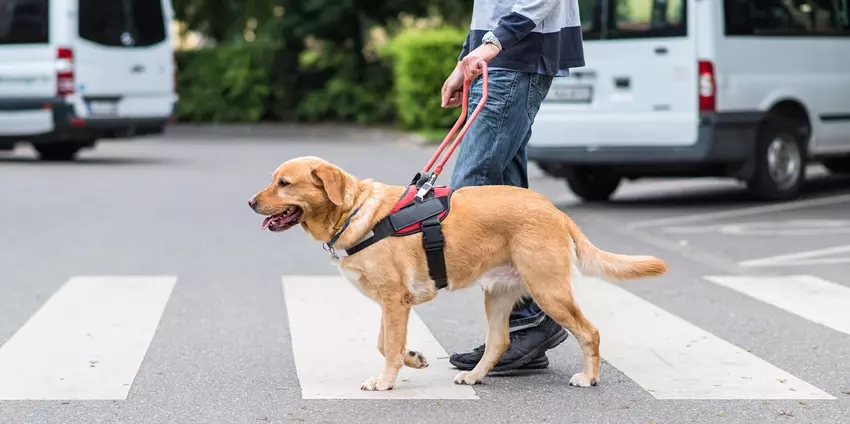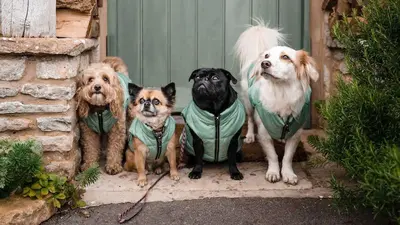National Guide Dog Month
- 27 Sep 2024
- 6m read

Every six minutes someone starts to lose their sight in the UK. For many of these individuals, having a guide dog becomes their lifeline. This month, we’re shedding light on the importance of supporting charities like Guide Dogs, that work tirelessly everyday to improve the lives of people with visual impairments.
Which Breeds are Used as Guide Dogs?
Certain breeds are selected to be trained as guide dogs due to their temperament and trainability, these include:
Labrador Retrievers
Labradors make pawfect guide dogs thanks to their natural intelligence, friendly nature and eagerness to please. especially when there’s food involved. These pups are quick learners and stay calm under pressure, making them reliable companions. Whether it's guiding their humans through busy streets or learning complex commands, their belly-driven motivation keeps them focused and responsive.
Golden Retrievers
Golden Retrievers are renowned for being fantastic guide dogs due to their gentle, patience and incredible intelligence. These sweet-natured pups form strong bonds with their humans, making them dependable and attentive in even the trickiest of situations. Their calm, friendly demeanour means they bring a sense of comfort and confidence to those they guide. Plus, with their sharp minds and eagerness to learn, they quickly master the skills needed to navigate the world safely.
German Shepherds
German Shepherds stand out as exceptional guide dogs due to their unmatched intelligence, discipline and strong sense of duty. These highly focused and reliable pups thrive in roles that require precision and quick decision-making, making them ideal for guiding in complex or high-pressure situations. With their natural confidence and protective instincts, they’re always alert to their human's needs, offering a reassuring presence at every step.
Poodles
Poodles might surprise you as guide dogs, but their intelligence and adaptability make them fantastic at the job. These clever pups are quick learners, picking up new commands and routines with ease. With their friendly, gentle nature, Poodles form strong bonds with their humans, offering both guidance and emotional support. Plus, their hypoallergenic coats make them a great choice for people with allergies.
How to Become a Guide Dog Trainer
In the UK, you must undergo training to become a qualified Academy Guide Dog Trainer. After completion of this training, you can specialise in one of two technical roles - Guide Dog Trainer or a Guide Dog Mobility specialist.
Using positive reinforcement techniques, Guide Dog Trainers are responsible for nurturing pups to give them the future skills and experience that they need to thrive in their role. Guide Dog Mobility Specialists, on the other hand, are responsible for matching pups with their owners, as well as providing continual, on-hand support.
The only formal requirement for these roles is a driving licence. However, ideal candidates will have relevant experience with dogs, in addition to being familiar with working alongside adults and/or children with disabilities. The learning plan involves a combination of practical and theory-based learning.
It is estimated that it will take around two and a half years to qualify as a Guide Dog Trainer, or three years if you opt to be a Guide Dog Mobility Specialist.
How Long Does it Take to Train a Guide Dog?
The length of time it takes to train a guide dog can take anywhere between 18 months to 2 years, it is entirely dependent on the individual dog.
Formal training usually begins at around 14 months old, but early socialisation begins from birth to ensure that they are accustomed to as many people, places and scenarios as possible.
How Much Does it Cost to Train a Guide Dog?
Guide Dogs estimate that it costs them around £38,110 to train a guide dog from start to finish.*
*This covers all the direct costs of the expert training a dog will receive from their first day at Guide Dogs school until they are matched with someone with sight loss and qualify together as a new partnership. This calculation is based on staff salaries, and the amount of time our dogs will spend with our different specialist staff throughout the training period, which, on average, took a total of 37.3 weeks in 2023.
What Happens to Retired Guide Dogs?
When guide dogs retire, many of them remain with their partnership family, as pets. However, this is not always possible.
Guide Dogs has a rehoming process for retired guide dogs. After years of hard work transforming the lives of visually-impaired individuals, it is crucial that guide dogs find the right forever home to live out their golden years.
Most guide dogs retire at around 10 or 11 years of age. By this time, they’re ready to embrace a slower lifestyle with less responsibilities. If you’re looking for a loyal companion who enjoys cuddles and a calm environment, then adopting a retired guide dog may be the perfect option for you. Ideally, they cannot be left alone for any longer than 4 hours at a time.
For more information on how to adopt a retired guide dog, see here.
It is also possible to rehome a younger guide dog that has been unable to complete their training, due to health conditions or behaviour.
How You Can Support Guide Dogs in the UK
There are many different ways that you can support the efforts of Guide Dogs, including:
Volunteering
Volunteering is a great way to show your support, with various roles available. This can include raising guide dog puppies, distributing collection boxes in your local community or speaking at public events on behalf of the charity.
Fundraising
Sponsored runs, coffee mornings, skydives and quizzes are just some of the ways you can fundraise for Guide Dogs.
Donations
Donations are the key to success for Guide Dogs. Without these charitable efforts, they would be unable to continue to provide their services. Whether it’s a one-off donation, sponsoring a puppy or leaving a gift in memory of a loved one, there’s lots of ways you can contribute if you are able.
Sighted guide training
Becoming a sighted guide is another way you can help. The training involves how to ask someone if they need help in a considerate manner, as well as guiding techniques to overcome obstacles, cross roads and getting into cars.
Campaigning
Being a campaigner is a crucial part of spreading awareness and creating action. Getting petition signatures, generating a conversation on social media and writing to local MPs are the sort of things you can expect to be doing as a campaigner.
Rehome a dog
After Guide Dogs have retired, it may not be possible for them to stay with their guide family. If this is the case, they have to be rehomed. Similarly, some dogs do not make it through the guide dog training programme due to health complications or behavioural issues, these dogs are also in need of their forever homes.
Invite a speaker
Inviting a speaker to your place of work, school and community groups is a great way to spread the word on the importance of Guide Dogs. These talks are provided free of charge, but it is encouraged to make a donation.
Guide Dogs Puppy Appeal
This October, Guide Dogs are asking people to support their puppy appeal, so that they can raise and train pups to become life-changing assistance dogs. This year, 1,300 puppies will start their journey to becoming a guide dog. With no government funding, Guide Dogs rely entirely on charitable donations. There are lots of different ways you can get involved including fundraising, volunteering, taking on challenges, sponsoring a puppy or simply donating.
For more information on how to get involved, head to The Guide Dogs Puppy Appeal.




